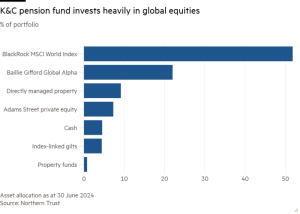German liberals in turmoil over ‘D-Day’ plot to end Scholz’s coalition
Stay informed with free updates
Simply sign up to the German politics myFT Digest — delivered directly to your inbox.
Germany’s pro-business liberal party is in turmoil after it was forced to publish an internal “D-Day” paper that discussed plans to bring down chancellor Olaf Scholz’s coalition.
The author of the paper and the secretary-general of the Free Democrats (FDP) resigned on Friday, taking responsibility for a scandal rattling a former ruling party that is struggling with low approval ratings ahead of snap elections in February.
It is the latest twist in a crisis that brought down Scholz’s fragile three-party coalition earlier this month, as Europe’s biggest economy wrestles with factory closures and one of the worst economic slumps since the early 2000s.
Scholz pulled the plug on the coalition by firing FDP leader Christian Lindner, his finance minister at the time, who quickly portrayed himself as an innocent victim in a “calculated rupture” of the alliance.
But an internal power-point presentation leaked to German media this week showed that the FDP had discussed what they described as “D-Day” options to quit the coalition weeks prior to Scholz’s move.
The paper even set out the “ideal point in time” for a government exit, the week of November 4. (Scholz sacked Lindner on November 6). The D-Day paper also describes four stages of a campaign that would culminate with the breakdown of the coalition — with the fourth called “start of the pitched battle”.
Responding to a flood of press requests, the party made the paper public on Thursday.
Scholz’s spokesman Wolfgang Büchner said on Friday that it left the chancellor “feel[ing] vindicated in his decision [to dismiss Lindner]”.
Prior to its publication, the FDP leadership consistently denied ever using the phrase “D-Day” in its discussions about the future of the coalition.
In a newspaper interview, Lindner rejected accusations of foul play, saying he was merely trying to engineer the “change in policy that this country needs [and which] the Scholz coalition could no longer deliver”.
He said it was “professional when staff run through different eventualities”.
But the publication of the paper triggered fury within the FDP. Franziska Brandmann, leader of the Young Liberals, said it was “unworthy of a liberal party” and created the impression that “not only the public but our own party was deceived for weeks”.
The FDP’s federal manager Carsten Reymann resigned on Friday after admitting he had drafted what he described as a “working paper” that was “simply a purely internal preparation for the scenario of the FDP leaving the coalition”.
The party’s secretary-general Bijan Djir-Sarai, who also stepped down over the affair, said he had had “no knowledge” of the paper, its preparation and its content. But he had “unwittingly” provided false information about it, for which he apologised.
“The general secretary is responsible for such an occurrence, and so I take political responsibility to avert damage to my credibility and that of the FDP,” he said.
#German #liberals #turmoil #DDay #plot #Scholzs #coalition






